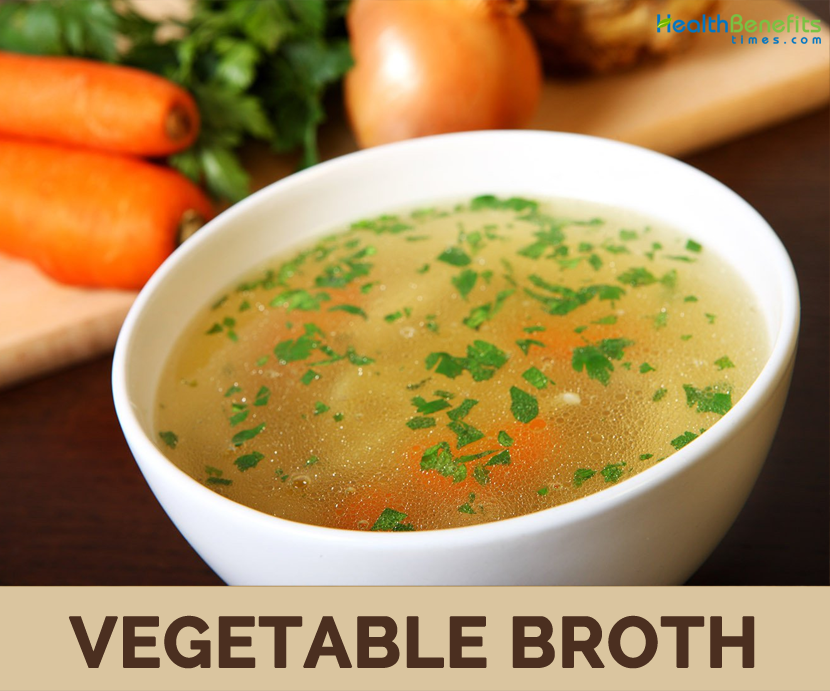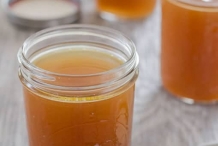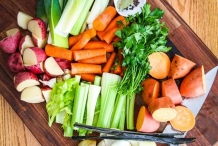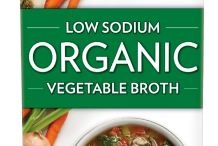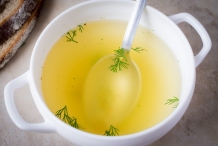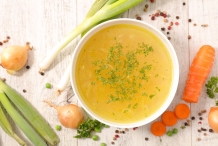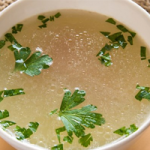Health benefits of Vegetable Broth
Homemade vegetable broth is healthier than the ones available in shops and hotels. Consuming it daily in the morning would improve your health in many ways and prevent certain health issues. Now, let us discuss about the benefits of vegetable broth. Below are some fantastic health benefits of drinking vegetable broth:
1. Source of Fibers
Vegetables are actually the rich source of fibers. Therefore, it is a good way to manage digestive system. It helps to avoid hemorrhoids and help in pregnancy digestive. Additionally, the fibers also help to maintain healthy intestine.
2. Rich in Nutrients
Vegetables broth is actually a rich source of important nutrients essential for proper functioning of the body. Thus, it can help to avoid nutrient lack during children development. Additionally, it can optimize nutrient absorption inside the body. It will optimize the brain and body function in performing daily activities.
3. Improve Eye vision
Vegetable broth consists of huge amount of vitamin A that helps to improve the eye. Therefore, it can enhance the vision and help to avoid eye diseases such as glaucoma or cataract. Also, it can optimize eye development in children. Which are the same benefits of avocado for eyes that bring good eyesight.
4. Ease Digestion
Fiber is a good way to manage healthy digestive system. Therefore, vegetable broth can help to optimize intestinal bowel movements and ease digestive process. Furthermore, it can avoid digestive problems and manage to avoid heartburn too.
5. Antioxidant
Vegetables broth is a good antioxidant. Therefore, it can help the body to eliminate free radical effects. Also, it can avoid early aging signs, such as wrinkles appearance. Hence, it brings younger body and appearance. This is the same health benefits of almond tea to reduce aging signs.
6. Strength the Bones
The content of minerals mainly calcium from vegetables will help to strength the bones. It can avoid osteoporosis and help to avoid bone fractures. Therefore, it will optimize the bones function and help with the bones growth for children.
7. Healthy Skin
Vegetables broth also helps to maintain a healthy skin. It brings a glowing smooth and silky skin. It also helps to avoid acne and any kind of skin inflammation. Additionally, it can help to avoid skin diseases.
8. Avoid Cardiovascular Diseases
Vegetable broth can help to avoid cardiovascular diseases such as heart attack or the stroke symptoms. It can help to maintain the cholesterol level inside the arteries and manage a healthy blood circulation. Besides, it will help to avoid fat inside arteries which enhance cardiovascular health.
9. Avoid Anemia
Vegetable broth contains iron that helps to stimulate the formation of red blood cell. Therefore, it manages to avoid anemia. Also, it will energize the body and avoid tiredness as the negative effect of anemia.
10. Improve Metabolism
It can help to manage body metabolism by optimizing energy changing from food. It helps to avoid fat formation and optimize nutrient absorption. Hence, the body metabolism will run well and the body will feel lighter.
11. Detoxification
Best way to perform detoxification is by consuming more and more fruits and vegetables. Therefore, this dish can help to eliminate toxin effect from the body. Additionally, it can bring a healthy body and hormone circulation.
12. Stabilize Blood Pressure
Vegetables are good to manage the blood pressure. Thus, it is a natural way to avoid hypertension. Make sure to consume carbohydrates to avoid the dropped blood pressure level.
13. Antibiotics
Some vegetables also work as natural antibiotics mainly onion and garlic. Therefore, it will help to reduce diseases in natural way. Obviously it cannot fasten cure as chemical medicine. But it is less effects. This is the same health benefits of Korean honey citron tea as natural antibiotics too.
14. Avoid Diabetes
Everybody knows that vegetables will help to avoid diabetes. This is due to the sugar content that is almost zero. Mainly green vegetables are good to manage blood sugar level. Therefore, it is a good way to manage diabetic symptoms. This is the same list medicinal plants diabetes that helps to avoid diabetes too.
15. Ease Blood Circulation
Another health benefit of drinking vegetable broth is to ease the blood circulation. It can avoid the formation of blood cod and optimize oxygen circulation inside the blood. Therefore, it will optimize brain function and respiratory system.
16. Soothe Cold Symptoms
It brings benefits to soothe cold symptoms. Therefore, it is one of a good treatment when having cold. Mainly if consume in warm condition. It can relaxed the breath and cool down fever.
Gut-Healing Vegetable Broth
Ingredients
- 12 cups / 2 3/4 liters filtered water
- 1 tbsp coconut oil or extra-virgin olive oil
- 1 red onion quartered (with skins)
- 1 garlic bulb smashed
- 1 chilli pepper roughly chopped (with seeds)
- 1 thumb-sized piece of ginger roughly chopped (with skin)
- 1 cup greens such as kale or spinach
- 3-4 cup mixed chopped vegetables and peelings I used carrot peelings, red cabbage, fresh mushrooms, leeks and celery
- 1/2 cup dried shiitake mushrooms
- 30 g dried wakame seaweed
- 1 tbsp peppercorns
- 2 tbsp ground turmeric
- 1 tbsp coconut aminos (see notes)
- A bunch of fresh coriander or other herb of your choice
- (optional) 1/4 cup nutritional yeast flakes for extra flavor and vitamins
Instruction
- Simply add everything to a large pot. Bring to a boil then simmer, with the lid on, for about an hour.
- Once everything has been cooked down, strain the liquid into a large bowl.
- Serve immediately with some fresh herbs, for decoration or cool for later. It also freezes well.
Magic Mineral Broth
Ingredients
- 6 unpeeled carrots, cut into thirds
- 2 unpeeled yellow onions, cut into chunks
- 1 leek, white and green parts, cut into thirds
- 1 bunch celery, including the heart, cut into thirds
- 4 unpeeled red potatoes, quartered
- 2 unpeeled Japanese or regular sweet potatoes, quartered
- 1 unpeeled garnet yam, quartered
- 5 unpeeled cloves garlic, halved
- 1/2 bunch fresh flat-leaf parsley
- 1 8-inch strip of kombu
- 12 black peppercorns
- 4 whole allspice or juniper berries
- 2 bay leaves
- 8 quarts cold, filtered water
- 1 teaspoon sea salt
Instructions
- Rinse the entire vegetables well, including the kombu. In a 12-quart or larger stockpot, combine the carrots, onions, leek, celery, potatoes, sweet potatoes, yam, garlic, parsley, kombu, peppercorns, allspice berries, and bay leaves. Fill the pot with the water to 2 inches below the rim, cover, and bring to a boil.
- Remove the lid; decrease the heat to low, and simmer, uncovered, for at least 2 hours. As the broth simmers, some of the water will evaporate; add more if the vegetables begin to peek out. Simmer until the full richness of the vegetables can be tasted.
- Strain the broth through a large, coarse-mesh sieve (remember to use a heat-resistant container underneath), then add salt to taste.
- Let cool to room temperature before refrigerating or freezing.
Comments
| Vegetable Broth Quick Facts | |
|---|---|
| Name: | Vegetable Broth |
| Taste | Delicious |
| Calories | 11 Kcal./cup |
| Major nutrients | Sodium (43.60%) Vitamin B1 (4.25%) Vitamin A, RAE (3.86%) Vitamin B2 (3.77%) Vitamin B5 (2.66%) |
| Health benefits | Soothe Cold Symptoms, Ease Blood Circulation, Avoid Diabetes, Stabilize Blood Pressure, Detoxification, Improve Metabolism, Avoid Anemia, Avoid Cardiovascular Diseases, Healthy Skin, Strength the Bones, Ease Digestion, Improve Eye vision |
| Name | Vegetable Broth |
|---|---|
| Ingredients | Carrots, green vegetables, garlic, tomatoes and onions |
| Spices | Salt and peppers |
| Cooking Time | Maximum of one hour |
| Taste | Delicious |
| Shelf Life | Refrigerator: For a Week Freezer: 2-3 months or more |
| Major Nutritions | Sodium, Na 654 mg (43.60%) Vitamin B1 (Thiamin) 0.051 mg (4.25%) Vitamin A, RAE 27 µg (3.86%) Vitamin B2 (Riboflavin) 0.049 mg (3.77%) Vitamin B5 (Pantothenic acid) 0.133 mg (2.66%) Copper, Cu 0.02 mg (2.22%) Iron, Fe 0.13 mg (1.63%) Carbohydrate 2.06 g (1.58%) Vitamin B3 (Niacin) 0.243 mg (1.52%) Vitamin K (phylloquinone) 1.5 µg (1.25%) |
| Health Benefits |
|


